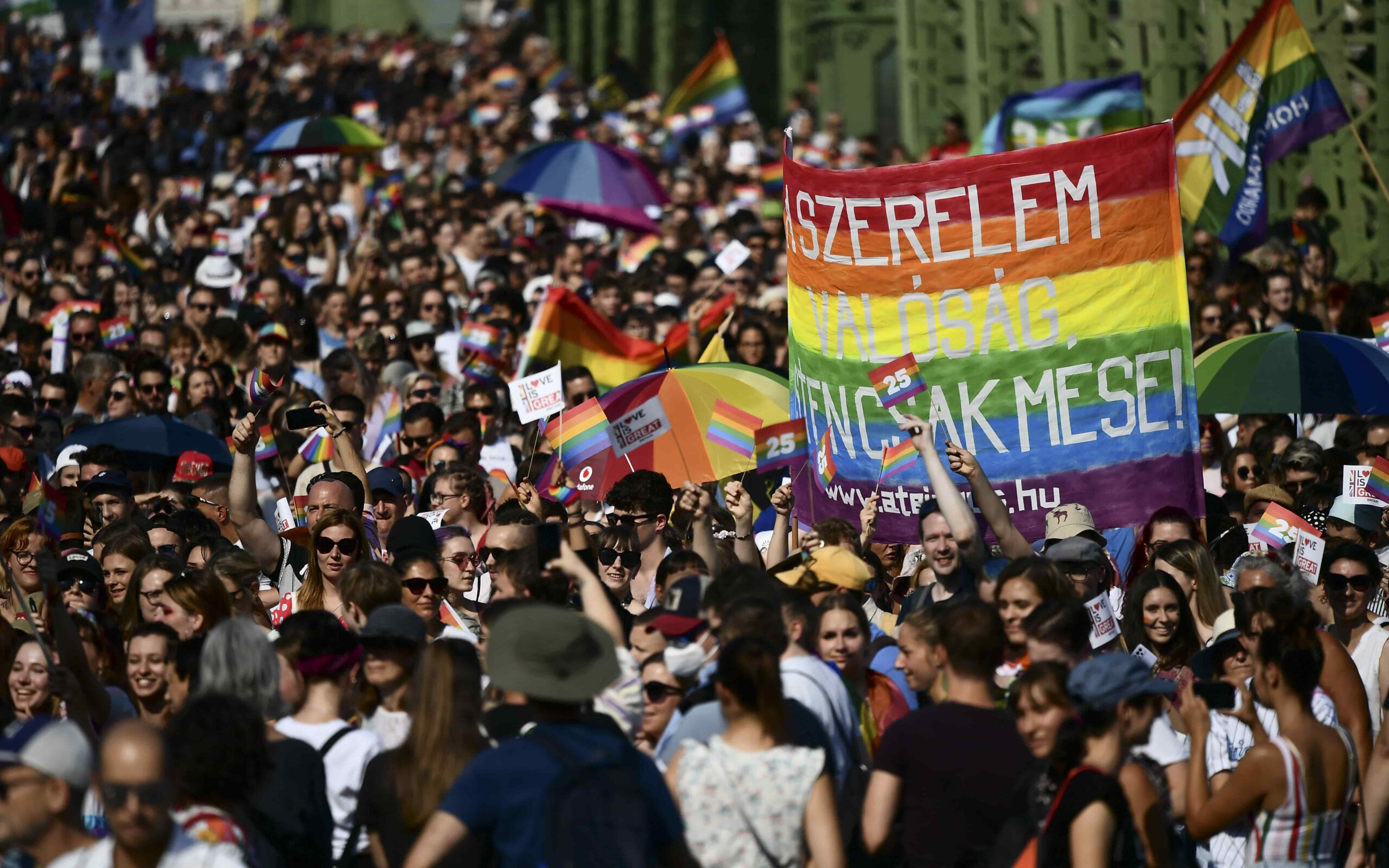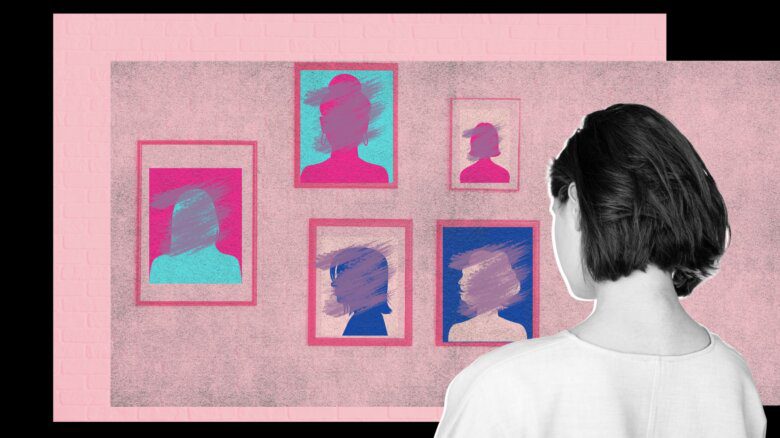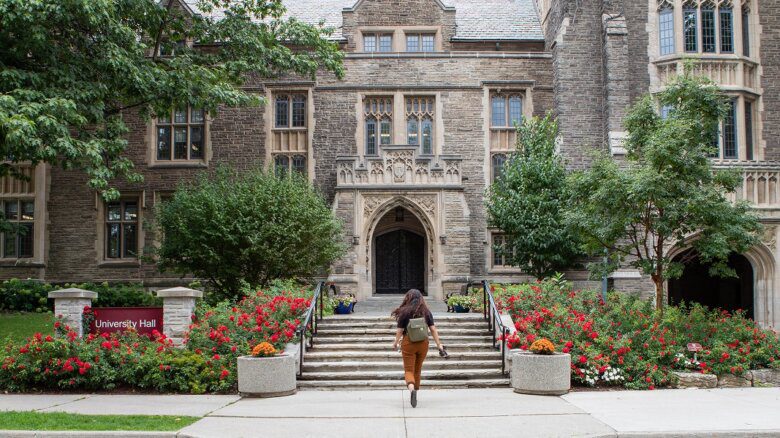When activists in Hungary decided to take on the country’s far-right prime minister and shut down an anti-LGBTQ+ referendum, it seemed like an impossible task. It wasn’t.
“The resources were just so infinitely different, with the government having basically an endless amount,” says Luca Dudits, who worked on the anti-referendum campaign and is a spokesperson for the Hungarian LGBTQ+ rights organization Háttér Society.
After an election campaign that stoked anti-LGBTQ+ hate, on April 3, Viktor Orbán won reelection in a dramatic victory over a united slate of opposition candidates. But the referendum, which was held on the same day, failed to pass after too many voters spoiled their ballots.
“To see this really come to life—it was so inspiring. For me, there’s a lot of hope,” Dudits tells Xtra.
The referendum asked voters four misleading questions about Hungary’s anti-LGBTQ+ “child protection law,” which was passed last year. The legislation, similar to Russia’s so-called gay propaganda law, restricts sharing information about sexuality and gender identity with minors.
The referendum questions included: “Do you support the unrestricted exposure of underage children to sexually explicit media content that may affect their development?” and “Do you support the promotion of sex-reassignment therapy for underage children?”
“That’s a bullshit question, because legal gender recognition and legal name recognition has been outlawed since 2020. Even legal, fully grown adults cannot access these,” says Anna Bakonyi, a spokesperson with Transvanilla, an organization that supports trans and non-binary people in Hungary.
The rest of the questions were equally absurd, she notes. One asked about banning any discussion of sexual orientation from classrooms, but if interpreted literally, the wording would have banned discussion of heterosexuality as well.
“To see this really come to life—it was so inspiring. For me, there’s a lot of hope.”
With the referendum victory in hand, activists in Hungary say they hope to keep the momentum going as they continue to fight back against whatever the government throws at them next.
“This is only the beginning, and no matter what the government’s agenda is for the next four years, I think we will come up with something that will show people that they have hope, and that together we can achieve anything,” Dudits says.
Since he was reelected as prime minister in 2010 after a term in opposition, Orbán has targeted minority groups—including LGBTQ+ Hungarians, asylum-seekers and Roma people—and external foes like the European Union and Hungarian-American philanthropist George Soros.
“They always make a social scapegoat—something or someone that they can take as an enemy; that they can defend the rest of society from,” Dudits says.
Like many conservative American politicians, Orbán and his populist Fidesz party have fixated on the imaginary spectre of queer and trans adults preying on children.
“What’s common in Western Europe today, and what they want to make common here, is to let sexual propagandists into schools and have them work with children,” Orbán said last year.
His government has ramped up anti-LGBTQ+ discrimination over the past two years. He amended the constitution in 2020 to define gender as sex assigned at birth, and family as a man and a woman—a move that effectively barred queer couples from adopting kids.
Another law passed in 2020 made it impossible for trans people to change their legal names and trapped dozens who were already mid-process in bureaucratic limbo. That change created an even bigger problem during the pandemic, as trans people were forced to constantly out themselves whenever they showed proof of COVID-19 vaccination and matching ID, which was required until recently in most public places.
Anti-gay legislation passed last year under the guise of punishing pedophilia makes it illegal to share LGBTQ+ content with minors and bans the “promotion” of queer and trans information in schools, similar to the “Don’t Say Gay” bill passed in Florida in March.
The Hungarian law is so vaguely worded that one trans teacher questioned whether it would make his presence in the classroom illegal.
Orbán has doubled down on his anti-LGBTQ+ policies despite threats from the European Union to pull billions of dollars in funding in response to what the union has called “violations of fundamental rights of LGBTIQ people.”
Days after Orbán’s election victory, the EU followed through on those threats, telling Hungary it had started the legal process to potentially deny loans and grants transferred from the EU to the country.
After 12 years of increasing discrimination, Orbán’s decision to hold the referendum and target LGBTQ+ people throughout the campaign came as no surprise, Dudits says.
Bakonyi believes Orbán wanted to focus on LGBTQ+ people and “child protection” to distract from the country’s economic troubles and increasing COVID-19 death toll, which has been one of the worst in Europe. “The referendum was just a big spectacle,” she says.
It hasn’t always been this way. Although equal marriage has never been legal in Hungary, homosexuality has been decriminalized since 1961, and civil partnerships for queer couples were legalized in 2009.
When Elona Musk, a drag queen from Romania who now lives in Budapest, first visited the Hungarian capital, she was thrilled to see a queer couple holding hands on the street.
“I was so shocked. ‘Oh my god, this is possible.’ Romania is even more orthodox and even more strict,” she says. “Seeing that just blew my mind. ‘Wow, this is possible. Hungary is so cool.’”
Musk moved to Budapest not long after Orbán’s government passed a 2011 constitutional amendment that defined marriage as exclusively between a man and woman. Since then, she says she’s felt that initial sense of freedom fade. “Over the past 10 years, I can count on one hand how many times I’ve seen gay couples holding hands,” she says.
She loves the queer community and the drag scene in Budapest. “It’s growing. It’s vibrant,” she says. “There are always new faces, always new styles.” She guesses there were maybe 10 queens regularly performing when she moved to Budapest—now there are three or four times as many, and it seems like they’re in demand everywhere.
That growth extends beyond just Budapest: as Orbán’s anti-gay policies get meaner, the country is actually becoming more progressive. Public support for marriage equality in Hungary almost doubled between 2019 and 2021, as a poll commissioned by Amnesty International Hungary and Háttér Society found last year.
Three-quarters of Hungarians say they believe trans people should be able to update official documents to reflect their name and gender, and 69 percent say they believe queer couples can be good parents, the poll found.
“Hungarian society is much more accepting than the government,” Dudits said at the time. Orbán’s anti-LGBTQ+ views seem to be out of step with what most people in the country actually believe—but he’s stoked a dangerous homophobic backlash.
“I see that the community is getting stronger together, bringing people together,” Musk says. At the same time, she’s watched as queer spaces and events have become more reserved, often moving into underground clubs.
Musk still holds her boyfriend’s hand in public, but just a few days before she spoke with Xtra, someone screamed slurs at them in the street. “The loud opposition is getting louder and fearless,” she says. She’s now thinking about moving elsewhere in Europe.
“I think there’s this very curious stage of fighting for equality, where the visibility is increasing, but the societal tolerance—or whatever you want to call it—is not increasing,” says Bakonyi.
That’s where she thinks Hungary is now: there’s a loud, noisy Pride parade in Budapest every year (this year’s is expected on July 23), and the city has a thriving LGBTQ+ community and positive community spaces. But that’s been met with an increasing backlash.
“There’s a very small circle of people for whom it is better, and for whom it is getting better, but for a very large number of people … it’s not getting better. And in a way, maybe sometimes getting even worse,” Bakonyi says.
Pressure from the authorities feels like a constant weight. “I do think that there’s this sort of looming sense of, just keep an eye open, keep checking over your shoulder, because you never know. Especially in the long run, that can be extremely detrimental to your mental health,” she says.
Orbán’s constant anti-LGBTQ+ rhetoric has only emboldened attitudes that people might have previously hidden, she says. “If you see that people in power are comfortable with using a certain kind of language, or certain kind of behaviour toward people, then suddenly you feel entitled to do the same.”
In this atmosphere, defeating the referendum seemed daunting, Dudits tells Xtra.
The party and its allies spent an estimated $11.5 million to wallpaper the country with billboards, many urging Hungarians to vote to “Protect the kids.”
The anti-referendum coalition, led by Háttér Society and Amnesty International Hungary, managed to fund about 50 of their own billboards—a fraction of what Fidesz was able to put up, Dudits says.
State-run media routinely parrot Orbán party lines, and the prime minister’s supporters control almost all of the country’s private media. The government also used a database of email addresses gathered during the COVID-19 vaccination campaign to send voters pro-Fidesz messages.
Where the governing party had a seemingly bottomless treasury, queer activists and allies relied on volunteers and social media to spread the word.
They mailed campaign materials to supporters in towns across Hungary, and hundreds of volunteers spread out throughout their communities to put up posters, talk with people and pass out flyers.
Campaign organizers set off on a road trip through more than 20 towns to talk with voters about the referendum. By collaborating with well-connected local activists, Dudits said they were able to gain support even in places where Fidesz is typically expected to have the vote locked up.
“The majority of people were really friendly and open to having a conversation,” she says.
Advertisement
In four videos produced by Háttér Society and Amnesty International that were widely shared during the campaign, LGBTQ+ Hungarians and allies talk about how they’ve been affected by homophobia and transphobia in the country.
They avoided arguing about the actual referendum questions, focusing instead on the stories of individual people—an important message, given that more than half of Hungarians say they don’t know anyone in the community, Dudits says.
“We thought that it would be more relatable for them to hear a mother say, ‘My son is transgender and I want him to be safe,’” she says.
With the opposition expected to have a slim but not impossible chance at unseating Orbán, activists didn’t want to call for voters to boycott the polls—instead, they asked supporters to spoil their ballots by voting “yes” and “no” to each question.
Bakonyi says she woke up on election day not knowing what to expect. The online response to the anti-referendum campaign made her feel cautiously optimistic, but she still worried it wasn’t an accurate predictor of how people would vote.
But then as Hungarians went to the polls, pictures of spoiled ballots began to flood social media.
“You could see the internet blowing up,” Musk says. People were posting pictures of their ballots shaded in rainbow colours, covered in cartoons or scribbled over with anti-Fidesz slogans. “Okay, this might fail,” Musk remembers thinking.
Many spoiled ballots featured drawings of a figure sliding down a drainpipe—a reference to Fidesz politician József Szájer, an author of Hungary’s 2011 constitution that banned marriage equality, who resigned after he was arrested in Brussels climbing down a drainpipe to escape a police raid on a “gay orgy” during a COVID-19 lockdown.
For the referendum to be binding, more than 50 percent of voters had to cast valid votes. The final results show that valid votes were overwhelmingly in support of Orbán’s policies.
But about 1.7 million people cast spoiled or invalidated ballots—21 percent of the total votes. About a third of voters didn’t fill out referendum ballots at all. It was more than enough to doom the vote.
“We still won. And we still defeated the hate campaign that the Orbán government has been putting out everywhere,” Dudits says.
Joy over the referendum victory was tempered by Orbán’s crushing victory—and then, a few days later, by the Hungarian electoral commission’s decision to slap anti-referendum organizers, including Háttér Society, Transvanilla and Amnesty International Hungary, with almost $33,000 in fines for allegedly violating election rules.
The organizations fought back and took the case to Hungary’s Supreme Court, where almost all of the fines were thrown out in an April 15 decision—except the cases of Háttér Society and Amnesty International. The court upheld Háttér’s almost $11,000 fine, which the group and Amnesty International say they’ll appeal to Hungary’s Constitutional Court.
After both the 2020 law banning name changes for trans people and the 2021 anti-LGBTQ+ law were passed, Transvanilla noticed an increase in donations and public support, Bakonyi says.
“It was all amid the heartbreak of the government’s actions, but it’s nice to see that there are people who still think that just being a human being and living your life the way you want to is an important thing,” she says. Now, she says they’re getting ready for whatever comes next.
“The election results—I think, for me, that ignited a lot of fight in me…. We can do this, and we have to do this,” says Dudits.
“I just don’t want them to feel like they are winning, because they are not. We are here. We have always been here, and we will always be here,” she says. “We are here to fight back. And we are here to defend each other.”


 Why you can trust Xtra
Why you can trust Xtra


